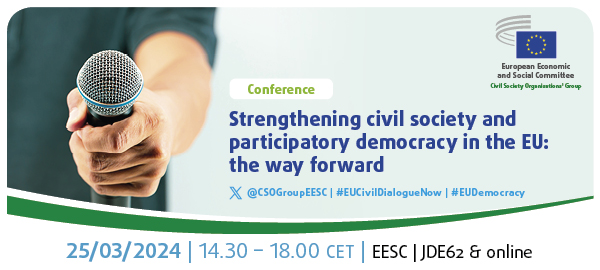On 25 March 2024, the Civil Society Organisations’ Group of the EESC held a conference on the topic of ‘Strengthening civil society and participatory democracy in the EU’. Taking place shortly before the European Parliament elections, the event explored how the EU can work towards achieving effective sustainable civil dialogue and participatory democracy and continuing to lead on civil society engagement and defending civic space in the coming EU term of office.
A structured, regular, transparent and inclusive civil dialogue can be a way to make European democracies more resilient to current societal challenges, the conference concluded. While the EU Treaty provisions are ambitious and the contribution of civil society organisations (CSOs) to our societies has been increasingly recognised, civil society representatives call for better implementation: existing mechanisms should be reformed and formalised as part of an inter-institutional agreement on civil dialogue. As a first step in this process, civil society representatives call for the creation of a working group on civil dialogue, to be convened following the European elections and bringing together all relevant stakeholders, including EU institutions. Such a working group could be facilitated by the EESC and tasked with co-creating the blueprints for a more enabling environment for CSOs in the policy-shaping process. Civil society representatives trust the European Parliament to continue acting as a driving force for an inter-institutional agreement on civil dialogue, as proposed by a Parliament resolution in 2022. The post of Vice-President in charge of contacts with CSOs should be confirmed in this regard.
Likewise, developing instruments for citizen participation is a way to build trust. While multiple good practice examples are emerging across the EU, it is important to ensure a meaningful implementation and follow-up, or risk fuelling disenchantment and political disengagement. Crucially, experience suggests that the structured involvement of civil society organisations in such processes is a precondition to their success and its potential should be further explored.
What is at stake: building trust and investing in qualitative policy solutions
- Our societies are undergoing deep and rapid changes. Geopolitical shifts, the changing climate and technological landscape can have the effect of shaking certainties and raising questions, to which there is sometimes no easy reply. At the same time, governments and institutions are being perceived as distant from the everyday realities of citizens.
- These challenges make it clear that we need to cherish and protect representative democracy as a political system and simultaneously invest in strengthening democratic practices and participation. This is not only a way to strengthen legitimacy and trust, but it is also instrumental to deliver on people’s needs.
- In this context, protecting and nurturing both civic and public spaces is critical, as they are a precondition to an enabling democratic environment.
- While their involvement requires distinct methodologies, citizens and CSOs alike are key to identifying creative and sustainable solutions, even to complex questions. They are capable of finding compromises beyond political short-termism. Active participation of CSOs is essential to ensure that policy-making is informed, evidence-based and that it brings to the table also the voices of vulnerable and under-represented groups. Likewise, deliberative instruments have the potential to overcome political blockages.
- Having enshrined participatory democracy as part of its democratic model, in particular through Article 11 of the Treaty on the European Union, the EU demonstrates significant farsightedness. Yet, its implementation leaves room for interpretation. There is a lack of clear guidelines on how civil society can hold an open, transparent and regular dialogue with EU institutions, leaving it to CSOs to keep civic spaces open and defend their right to dialogue.
Following the EU elections: continuing to lead on civil society engagement and defending civic space
- If we want to harness CSOs’ potential in an effective, inclusive and transparent way, then we need to involve them as part of a structured civil dialogue, all the while respecting representative democracy and the prerogatives of social partners in social dialogue.
- To this end, existing civil dialogue mechanisms should be reformed and, ultimately, formalised as part of an inter-institutional agreement on civil dialogue. Such an agreement could provide clarity and stability to all players involved, avoid duplication and prevent loss of trust and discontent.
- As a first step in this process, civil society representatives call for the creation of a working group on civil dialogue, charting out the guidelines for a structured, regular, transparent and inclusive dialogue: who is consulted, on which topics, along which timelines, with what outcomes?
- This working group should be open to EU institutions and bodies and EU civil society networks. The EESC, given its experience and role as institutional representative for civil society, is in a unique position to facilitate this exercise.
- Civil dialogue, within such a framework, should be implemented as a complementary, but separate process to social dialogue, that also contributes to greater prosperity and inclusion.
- CSOs have been advocating for a structured civil dialogue for decades, with the Conference on the Future of Europe and its final recommendations in mid-2022 creating a momentum for progress. Since then, significant advances have been made with an EESC opinion requested by the Belgian Presidency of the Council of the EU, demonstrating political commitment to the topic. This opinion charts out concrete proposals for the way forward on civil dialogue, including the call for an underlying civil society strategy and a monitoring system for civil society engagement, based on an annual civil society scoreboard and the creation of an observatory.
- However, this momentum must not be lost and implementation must continue in the next EU term of office. As we move into a period of EU elections and questioning of pro-European sentiment, civil society relies on the political support of those who want the EU to remain a leader in civil society engagement and civic space.
- In this framework, the portfolios of the European Parliament and European Commission Vice-Presidents in charge of contacts with CSOs should be confirmed.
- For the newly elected European Parliament, the hearings of commissioners scheduled for the Autumn will be the opportunity to test their political commitments to civil dialogue.
Fostering an integrated approach to participatory democracy by relying on meaningful implementation and civil society involvement
- Instruments for direct citizen participation, for instance through inclusive public participation and deliberation, are opportunities for building trust, developing creative solutions and conducting reality checks.
- Citizen participation can complement civil dialogue as part of a wider effort to strengthen participatory democracy and within a system of representative democracy.
- Participatory initiatives are multiplying across Europe and at EU level, such as the citizens panels being organised by the European Commission. A conference bringing together institutions and EU bodies could be the opportunity to further explore and develop synergies in this field.
- It is crucial to ensure that such initiatives are not being used to erode civil or social dialogue, for instance by engaging with individuals at the expense of dialogue with organised forms of civil society, or reduced to a mere box-ticking or public relations exercise[1].
- On the contrary, experience shows that opportunities for citizen engagement are the most successful when they are accompanied by a framework for civil society involvement, covering all policy areas, and their fruitful interaction should be further explored.
- Acting as policy experts, partnership with CSOs is crucial in terms of agenda- and topic setting. Moreover, CSOs work as enablers, promoting participatory approaches, and call for proper follow-up, acting as watchdogs to ensure that proposals are implemented and feedback is given. In addition, they contribute as knowledge holders and contribute to the diverse representation of ideas by voicing the interests of vulnerable and under-represented groups. At European level, the EESC represents a unique platform for civil society to come together and it has the full potential to contribute to these processes.
- Furthermore, additional fundamental quality assurance mechanisms need to be present in order for a process to be meaningful and avoid creating feelings of frustrations and distrust. This includes neutral moderation, qualitative and diversified sortition or selection processes, situatedness and continuity to the process.
- Finally, investing in civic education and empowering citizens to take part in public life cannot be understated and is fundamental to a vibrant democracy.
Background
The conference saw the presentation of two flagship initiatives:
- The EESC Opinion on Strengthening civil dialogue and participatory democracy in the EU: a path forward (SOC/782), requested by the Belgian presidency of the Council of the EU and adopted by the EESC in February 2024.
- A joint Open Letter on civil dialogue, issued by the Civil Society Organisations’ Group and Civil Society Europe in January 2024, which received the support of 156 signatories from 26 EU Member States. The letter calls on the main EU institutions to take concrete measures to implement open, transparent and regular dialogue with CSOs in all policy areas.
The event was attended by EU institutions, EESC members and civil society representatives and featured discussions with high-level guests, including:
- Mr Pedro Silva Pereira, Vice-President of the European Parliament, responsible for replacing the President, Roberta Metsola, for contact with civil society organisations representing citizens;
- His Excellency Willem van de Voorde, Belgian Ambassador and Permanent Representative of Belgium to the EU;
- A video message by Dubravka Šuica, Vice-President of the European Commission for Democracy and Demography.


